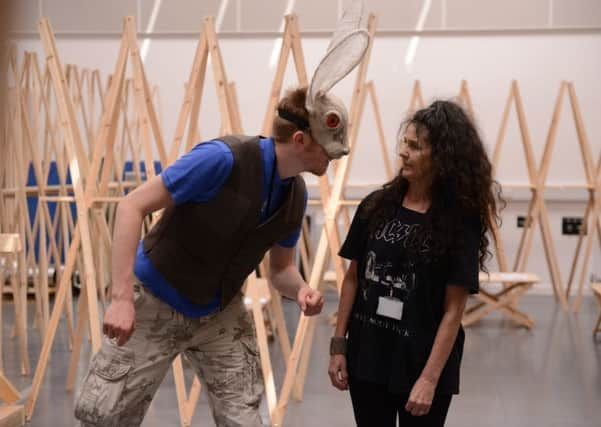Theatre interview: Graham Eatough on The Reason I Jump


Higashida’s first book, The Reason I Jump, an imaginative question-and-answer session about his experience of autism, was written in 2005, when he was 13, and published in Japan two years later. It was in 2013, though – when the English writer David Mitchell and his wife Keiko Yoshida published their English translation – that the book shot to international fame, becoming a British and US bestseller. The then National Theatre of Scotland boss Laurie Sansom applied for stage adaptation rights; and then he passed the book on to Glasgow-based international director Eatough, who, like Mitchell and Yoshida, has a son diagnosed with autism.
“It is a remarkable book,” says Eatough, “with this structure built around 58 questions that people might want to ask about autism, but also woven together with imaginative passages that are more like pieces of creative writing. There’s no story to follow, no narrative arc or anything like that; and we decided at quite an early stage – myself and the writer on the project, Clare Duffy – that we would use The Reason I Jump as an inspiration, but also include the voices and experiences of our cast of autistic performers, so that it would be their story, as well as Naoki’s.”
Advertisement
Hide AdThe result has been a long development process of around two and a half years, which has produced a script shaped by detailed interviews with all the performers. The cast consists of four autistic actors – ranging in age from 18 to 60, and including two stars of the Edinburgh-based Lung Ha company, Nicola Tuxford and Emma McCaffrey – and one other actor, Fletcher Mathers, who will perform some of the imaginative passages from The Reason I Jump.
For Eatough, though, it was always obvious that this show-without-a-story also needed a special setting, one that would invite audiences to travel through the experience rather than simply having it presented to them, and would reflect Higashida’s profound response to the natural world. Eatough was aware of North Kelvin Meadow, close to his Glasgow home; and gradually the idea emerged not only of performing the show there, but of creating an outdoor maze and labyrinth through which audience members will pass, meeting the various performers along the way.
“I had some quite negative experiences of taking my son to the theatre when he was younger,” says Eatough. “He didn’t like the feeling of being trapped in his seat for the whole performance; and I really wanted this to be not just a show by autistic people for those who are not autistic, but to be something that autistic people themselves could enjoy, and experience as their own.
“So with the Dutch artist Andre Dekker as designer, we started working on this idea of creating a maze through which people could move, and a labyrinth at the centre of the maze. I worked with Andre on the Nomanslanding project that appeared in Glasgow last year; and together, we’ve been exploring the difference between maze and labyrinth.
“In some ways, you know, a maze is the opposite of a labyrinth – a maze presents you with constant choices and a problem that has a solution, whereas a labyrinth is more like a test of courage and endurance with just one way through, where you have to give yourself up to the journey. And that reflects the way that people diagnosed with autism can have mental traits that are often the complete opposite of each other – some autistic people are non-verbal, for example, whereas others find it difficult to know when to stop talking.”
Eatough is conscious that Higahshida’s books have been the subject of some controversy, with some critics suggesting that they represent what his parents might wish was going on in the mind of their autistic child, rather than a real subjective account. Eatough is convinced, though, that Higashida’s prolific writing career since 2005 suggests the books are indeed his.
Advertisement
Hide Ad“The thing is that autism covers such a huge range of mental abilities and disabilities that it can be difficult – not least for parents with an autistic child – to believe what some autistic people can achieve, given the chance, and how profoundly disabled others can be. There is common ground around a kind of difficulty with normal social interactions – but beyond that, the range is immense.
“So what we hope, with this show, is that as members of the audience move through it for an hour or two, at their own speed, it will create a lot of space for each of us to do some self-reflection, and to consider how “normal” or strange our own interactions with the world sometimes are. Because when you start working closely with people with autism, you realise very quickly that it’s not just a matter of us and them. It’s about all of us understanding ourselves better; and we hope that we can make some room for that to happen, by creating this show, in this slightly magical place.”
The Reason I Jump is at North Kelvin Meadow, Glasgow, from 11-23 June